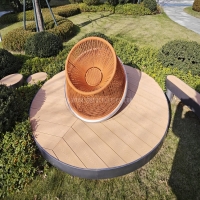Welcome to the website for landscape facilities products and knowledge.
What are the environmental impacts of producing and disposing of landscape tables made from synthetic materials?
The production and disposal of landscape tables made from synthetic materials, such as plastic or composite resins, pose significant environmental challenges. During manufacturing, these tables rely on petroleum-based plastics, which contribute to greenhouse gas emissions and deplete non-renewable resources. The process also involves energy-intensive methods, further exacerbating their carbon footprint.
Once discarded, synthetic tables often end up in landfills, where they can take hundreds of years to decompose, releasing microplastics and toxic chemicals into soil and water systems. Incineration, another disposal method, releases harmful pollutants like dioxins into the air. Additionally, synthetic materials are rarely recycled efficiently due to contamination and mixed compositions, leading to increased waste accumulation.
To mitigate these impacts, consumers and manufacturers can opt for sustainable alternatives like recycled plastics, FSC-certified wood, or biodegradable composites. By prioritizing eco-friendly materials and circular design principles, the furniture industry can reduce its environmental harm while maintaining functionality and aesthetics. Awareness and responsible disposal practices are also crucial in minimizing the long-term ecological consequences of synthetic landscape tables.
Related search:

Recommendation
Swivel chair-Specialty steel structure woven rattan leisure chair with rotatable design